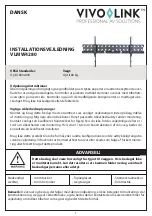
7
Wood stud walls (Fig 3b)
1. Use a pencil, awl, or a nail to mark the location of the wall stud centers (Fig 3b) after locating the
stud with an electronic stud locator. The distance between marks should not be less than 16 inches
(Studs must not be less than 16 inches (40.6 cm).
-
ing the holes in the mount with the studs (Fig 3c). Use the wall plate as a template to mark the
location of all four mounting holes on the wall. Make sure that the mounting holes are level and are
parallel.
3. Use a 5 mm drill bit to pre-drill holes at least 40 mm (1.6 inches) deep at the marked locations.
4. Use the supplied box-end wrench (6), the four long bolts (J), and washers (L) to attach the wall
mount to the wall. Do not use wall anchors in wood stud walls.
5. Use the built-in level to level the wall mount (Fig 3d), repositioning as necessary, then securely
tighten the bolts.
Fig. 3b
Fig. 3c
Fig. 3d
Concrete Walls:
to mark the location of all four mounting holes on the wall. Make sure that the mounting holes are
level and are parallel. The distance between marks should not be less than 16 inches.
(Studs must not be less than 16 inches (40.6 cm).
2. Use a 10 mm drill bit to pre-drill four holes at least 50 mm (2 inches) deep at the marked locations.
3. Insert a wall anchor (K) into each pre-drilled hole and lightly tap it with a hammer until the wall an-
4. Use the supplied box-end wrench (6), the four long bolts (J), and washers (L) to attach the wall
mount to the wall with the wall anchors.
5. Use the built-in level to level the wall mount (Fig 3d), repositioning as necessary, then securely
tighten the bolts.
1
L J 6
Summary of Contents for A580TM
Page 11: ...11 ...






























